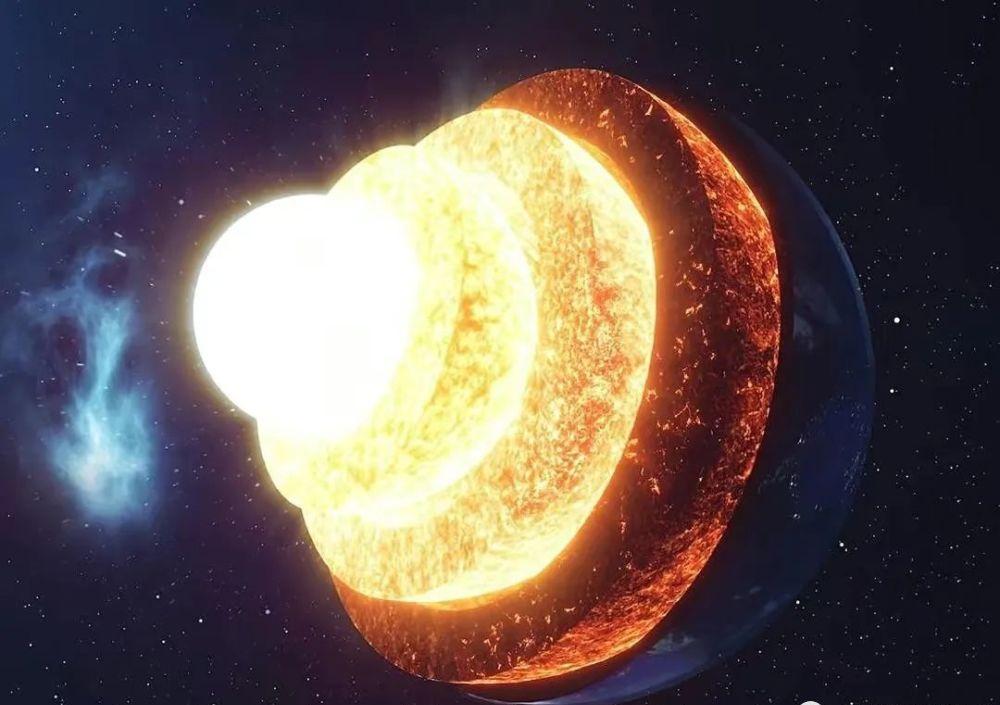It is well known that in recent decades, the global average temperature has been rising slightly due to the increase in the concentration of greenhouse gases such as carbon dioxide. If the temperature rises to a certain value, even the ice sheets at both poles will be completely melted. In recent years, the frequent occurrence of extreme weather in the world may be related to the impact of the greenhouse effect.
However, in January 2022, Earth and Planetary Science Letters published a study by scientists at ETH Zurich, which showed that the Earth's interior is cooling faster than previously expected. In other words, as global temperatures rise, the temperature inside the Earth is accelerating. What's going on?

The source of heat in the Earth's interior
The closer you get to the Earth's interior, the higher the temperature. The earth can't rely on nuclear fusion to heat up like the sun, so where does the heat in the earth's interior come from? Research shows that the heat in the Earth's interior comes from three sources.
Some of this comes from residual heat from the beginning of the Earth's birth.
Scientists speculate that the Earth was formed from scrap material after the birth of the sun. The material collided and converged under the influence of gravity, and eventually formed the rocky planet Earth. Shortly after the Earth was born, under the previous violent collision, the entire surface of the Earth was in a state of melting. As the earth continues to radiate heat into space, the entire surface of the earth gradually cools and solidifies, and earth-shaking changes occur.
Because the thick layers of rock on the Earth's surface block the loss of heat, a lot of heat remains in the Earth's interior. It is speculated that the temperature at the Earth's core is as high as 6,000 degrees Celsius, which is higher than the temperature of the sun's surface.
Another part of the earth's interior comes from the decay of radioactive elements.
There are some natural radioactive elements in nature, and the Earth's interior deposits a large number of radioactive elements such as uranium-238, uranium-235, thorium-232 and potassium-40, which have a long half-life, up to billions of years, and can continuously release heat through radioactive decay. For 4.6 billion years, the Earth's interior has not cooled prematurely, and this is related to this.
In addition, tidal forces of celestial bodies such as the Moon can also cause friction at different interfaces in the Earth's interior, resulting in heat, but this heat source accounts for a small proportion.
So is the earth really going to be cold?
In the latest study, scientists found that brink rock, which is ubiquitous in the mantle, has a thermal conductivity 1.5 times higher than previous data, which means that heat at the Earth's core can be transferred more quickly to the mantle and surface, which will accelerate the cooling rate of the Earth's interior.
However, the cooling of the Earth's interior is not a new topic, and scientists have long known about it. For example, volcanic eruptions, geothermal heat, etc. are all ways to lose heat from the earth's interior to the outside world.
The new study simply found that the Earth's interior is cooling faster than expected, and that doesn't mean it's going to be cold right away.
What impact does this have on humans?
The Earth's interior is rich in thermal energy, which is stored in the core and mantle of the Earth. The energy sources of various geological movements such as the drift of the Earth's plates and volcanic earthquakes depend on the heat inside the Earth.
If the Earth's interior gradually cools down, geological activity will weaken, which seems to be a good thing for humans, after all, the frequency of volcanic earthquake eruptions will be reduced.
However, the formation of the Earth's magnetic field is related to the activity of the Earth's interior. If the Earth's core gradually cools, the Earth's magnetic field will weaken or even eventually disappear.
Needless to say, the importance of the Earth's magnetic field is like a huge protective barrier that can deflect charged particles from the Sun and the like, and avoid the atmosphere, life, etc. on the Earth's surface from being bombarded by these streams of high-energy charged particles. The stream of high-energy charged particles from the Sun, also known as the solar wind, without the protection of a strong magnetic field, the solar wind will blow away a large part of the atmosphere on the planet's surface, and Mars and Mercury are a good example. Atmospheric pressure is too weak, liquid water is difficult to exist, and water vapor will eventually be slowly blown away by the solar wind.
Studies have shown that Mars had a very similar environment to Earth's billions of years ago, not only with a relatively dense atmosphere, but also with an ocean of liquid water. However, these disappeared as the Martian core cooled and the magnetic field gradually weakened.
If the Earth's core is completely cooled, I am afraid it will become the second Mars, and eventually it will become a desolate planet.
However, Earth is the most massive rocky planet in the solar system, and due to its mass, heat loss is slower. In the hundreds of millions or even billions of years to come, the heat in the Earth's interior will remain at a high level.
Moreover, how long humans will be able to survive on Earth is still unknown, so we don't have to worry about it now.
WeChat public account: scientific exploration of bacteria